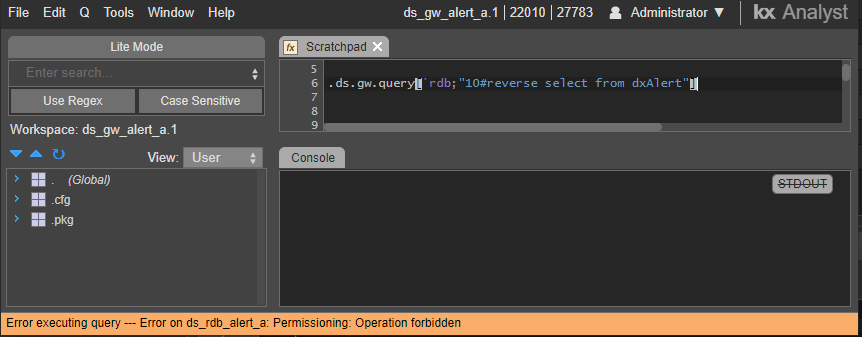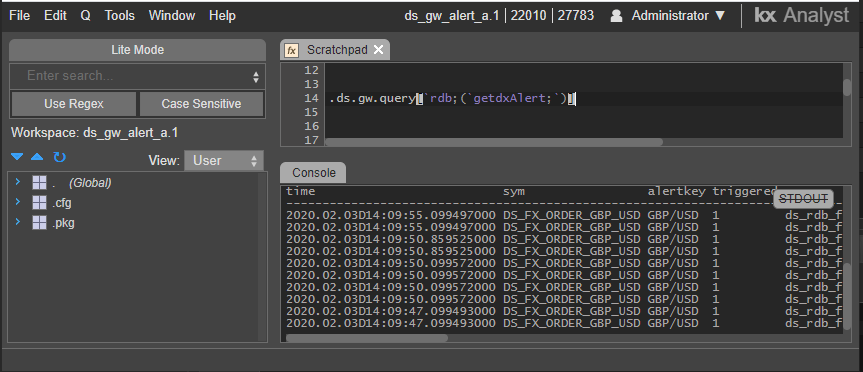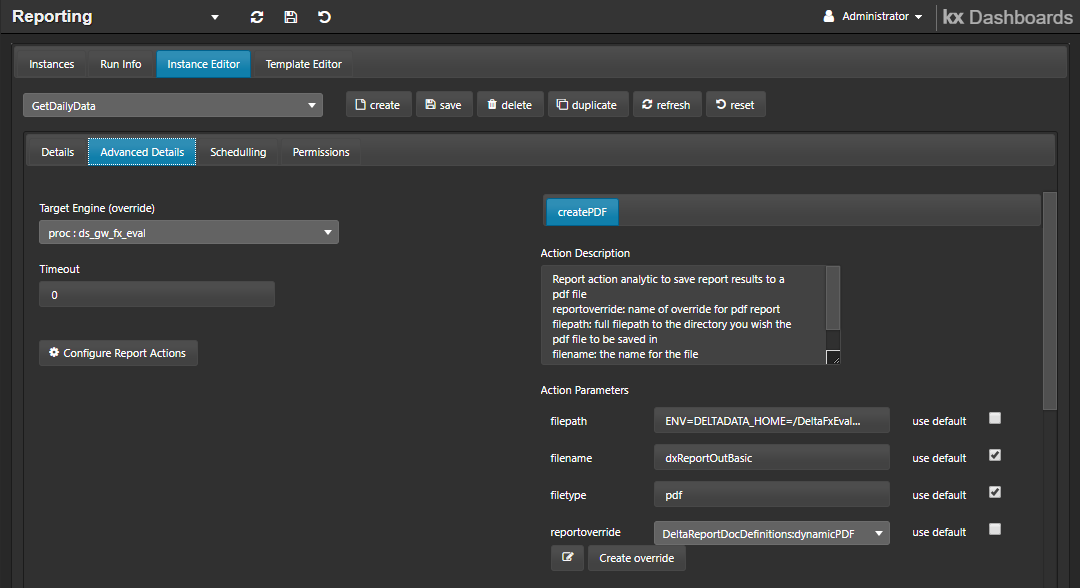Security and permissions
Permissions are enforced when clients execute requests over IPC. Users are assigned roles and entitlements via Control and this dictates what operations they can perform on a process.
The permissions enforcement is done in Control code added to the kdb+ IPC handlers, i.e. .z.pg for sync requests.
Control has permissions enabled by default but instances can be configured to have them enabled or disabled.
Secure parser
KX Control contains a secure parser which when enabled ensures all queries are tightly permissioned at a function level to ensure the calling user is allowed access to that function and data.
The functionality is disabled by default but can be enabled via an environment variable in delta.profile by setting DELTACONTROL_SECURE_PARSER=YES.
The secure parser handles the parsing and enforcement of incoming requests. It inspects the request format and checks whether the calling user is entitled to run it.
With the secure parser enabled, users are restricted to calling named APIs only. The logic then checks what APIs the user is entitled to call and executes or rejects depending on the permissions. If not enabled, a legacy query parser is used. However this isn’t the recommended mode as the performance and security are not optimal.
Administrators are entitled to call all APIs but also are not restricted to API-only. They can execute strings and lambdas.
String and lambda requests are forbidden to non-admin users.
Example formats
The table below details the different request formats and entitlements required for a user to execute.
(`func; param1; …; paramN) Read access on func
("func"; param1; …; paramN) Read access on func
"func [param1; ;; paramN]" Administrator only
"1+1" Administrator only
( { … }; param1; …; paramN) Administrator only
("{ … }"; param1; …; paramN) Administrator only
Lambdas
The secure parser forbids lambdas for non-admin users, however with this disabled, they are allowed. To explicitly disable them, set DELTACONTROL_LAMBDA_PERMISSIONED=YES in the delta.profile.
Control logins
The ability to open direct handles to Control is restricted to permissioned users.
For a non-admin to access Control, they must have permission on the CxLogin entity group.
The restriction only applies to IDE connections or direct IPC handles to Control. Connections via the App Server are unaffected.
Process-level administrator
Users can be configured as administrators on specific process instances. This allows users to execute requests unrestricted on specific processes while still being restricted across the whole platform. This is set up by giving a user Read/Write access to the process instance entity. Note that this administrator status only applies to the process instance itself, the user may not have permission to access Control UI or the process editor in Control UI. For more information on the permissions required to access these, see the Control UI API permissions section.
Async requests
Permissions are not enabled on async requests in instances by default. For some latency-sensitive use-cases where permissions aren’t a concern, this is desired behavior. For other cases, they can be enabled by setting the .pm.async.enabled instance parameter to true.
Enhanced instance configuration
Analyst sandbox permissions
The ability to launch new instances for the Analyst Create Process Mode requires granting membership to the CxSandbox entity group.
Existing sandbox instances can be launched by users who have permissions for the instance, regardless of having CxSandbox membership.
Further restriction may be imposed by adding a CxDaemonAccess parameter entity.
New install security
A new install will have the secure parser enabled by default. The deltacomponent user will also not be an administrator user on a new install. These settings ensure a new install of KX Control will be in the most secure configuration possible. The environment variables in delta.profile will be configured to be
DELTACONTROL_SECURE_PARSER=YES
DELTACONTROL_LAMBDA_PERMISSIONED=YES
DELTACONTROL_DELTACOMPONENT_ADMIN=NO
To overwrite this and maintain the old behavior the following can be included in install.config before install skip-secure-deploy=1 or the delta.profile can be updated after install and before starting KX Control with the following:
DELTACONTROL_SECURE_PARSER=NO
DELTACONTROL_LAMBDA_PERMISSIONED=NO
DELTACONTROL_DELTACOMPONENT_ADMIN=YES
An upgrade to KX Control will not change the existing settings for these environment variables.
Security and the deltacomponent user
The deltacomponent user is used within KX Delta Platform to open connections between processes, make queries and execute reports. The user can be configured to be an administrator user or not. This is governed by the DELTACONTROL_DELTACOMPONENT_ADMIN environment variable in delta.profile. Setting its value to YES will mean deltacomponent is an administrator; if it is set to NO the user will not be an administrator user.
Requests by administrators bypass permissions, including string or lambda ones. For this reason it is more secure to deploy with deltacomponent as a non-administrator user. New installs of KX Control will have the secure parser enabled and the deltacomponent user configured to be a non-administrator user.
With the secure parser enabled and deltacomponent configured to be a non-administrator user, several areas in solution code may need attention to ensure KX Delta Platform operates as expected:
IPC calls
Direct calls to KX Control or between permissioned processes via a handle opened as deltacomponent or other non-admin user will undergo a permissions check. The deltacomponent user is only permissioned for a specific list of API into Control so any direct calls may fail the permission check. It may be necessary to grant deltacomponent (or the relevant user) permission to whatever API are used in this manner. This could be achieved by adding an entity group that deltacomponent (or the relevant user) has select permission to and adding the API to the group.
If string or lambda queries between processes via a handle opened as deltacomponent or another non-admin user are being used as part of solution code, these will be disallowed when the secure parser is enabled. They should be replaced with function calls (i.e. analytics or API) and the relevant user granted permission to the functions.
Queries from processes to KX Control using .ex.prh or .ex.prhAsync are executed as deltacomponent user. The same restrictions on string or lambda queries and unpermissioned API queries will apply to queries made using .ex.prh or .ex.prhAsync. The deltacomponent user should be granted permission to any API queries used via .ex.prh or .ex.prhAsync. For details of .ex.prh and .ex.prhAsync see the Process API document here.
Opening connections
deltacomponent has select permission on all process instances, tasks and service classes. Opening connections from KX Control to running processes or between running processes as deltacomponent should be unaffected by any change to the administrator status of deltacomponent. A handle can be opened between KX Delta Platform processes as deltacomponent using the process API .utils.dcc. To open the handle as deltacomponent using .utils.dcc the following conditions must be met:
- Process template file is in a allowlist of core Control templates
.utils.dccnot being invoked as part of another IPC call (.z.wis 0)- If invoked in an IPC call, the remote user (
.z.u) is alsodeltacomponent
Gateway queries
If deltacomponent is not an administrator user, they will require select permission on any gateway queries executed in solution code. To ensure this, the queries should be analytics (or API), not strings or lambdas. An entity group should be created and deltacomponent granted select permission to it. The analytics for the gateway queries should be made members of this entity group. deltacomponent will then be able to execute these analytics as gateway queries. Similarly for any calls in solution code that go between processes, these should be in functional form and be added to an entity group deltacomponent has select permission to.
Example
A gateway query in string form will fail if the secure parser is on.

To remedy this an analytic could be created which should be loaded by the target process.

Create an entity group and add the new analytic to it.

Give the deltacomponent user permission to the entity group.

Making the gateway query using the new analytic will now be successful.

Reports
The deltacomponent user is used to execute reports and is therefore granted select permission on all report instances. This alone will not allow solution reports to be executed without a permission failure. For any reports that are not a part of KX Delta Platform, an entity group should be created and deltacomponent granted select permission to it. To this entity group should be added any report templates, analytics executed as part of the report (including action analytics) and config parameters used as part of the report. Once deltacomponent has select permission on all these entities via the entity group, the reports should execute successfully.
Example
A new report instance created using an existing report template and report analytic, but a new action analytic that takes config as a parameter, fails a permission check when the report runs


To overcome this create an entity group and add any report templates, report analytics, action analytics and config used as part of the report. In this case the new action analytic and config override used need to be added.

The deltacomponent user should be given access to the entity group.

The report will now run successfully.

RDB end of day
One area that may be affected by the secure parser being enabled, and deltacomponent not being an admin user, is end-of-day actions run on a permissioned HDB from the RDB. If this code has been written in string/lambda format then this would be disallowed. An example of this might be reloading the HDB.
In addition, under the strictest permission conditions, the RDB may not be able to use .utils.dcc) to connect to the HDB. The RDB therefore maintains handles to the HDBs configured for the process and will attempt to reconnect via a function on the timer if the connections are dropped. The handles can be retrieved with the API provided:
.ds.rdb.getHdbHandle
Handle to the first HDB
Syntax: .ds.rdb.getHdbHandle[]
Returns the handle to the first HDB configured in the process instance parameters for the RDB.
q).ds.rdb.getHdbHandle[] / returns a single handle
12i
.ds.rdb.getHdbHandleList
Handles to all HDBs
Syntax: .ds.rdb.getHdbHandleList[]
Returns the handles to all the HDBs configured in the process instance parameters for the RDB.
q).ds.rdb.getHdbHandleList[] / returns a list of handles
12 14i
.ds.rdb.getHdbHandleByInst
Handle to a HDB
Syntax: .ds.rdb.getHdbHandleByInst hdb
Where hdb is the name of a HDB process instance as a symbol, returns the handle to it, if it exists.
q).ds.rdb.getHdbHandleByInst[`ds_hdb_ops_a] /returns handle for the named HDB
12i
To ensure end-of-day actions are successful:
- Code executed on the HDB from the RDB should be in functional form (i.e. analytics or API)
- To get the HDB handle on the RDB the API outlined above can be used, the handles are opened as the
deltacomponentuser - Permission any analytics/API for the calling user. If the API above are used, this will be the
deltacomponentuser, so grantdeltacomponentpermission to any analytics/API called on the HDBs
An example of EOD code that could run on the RDB to reload the HDB would be:
..
// Connect to HDB and reload the dataBase.
.log.out[.z.h;"Calling HDB reload Function";()];
h:.ds.rdb.getHdbHandle[];
$[h>0;
[
@[neg[h];
(`.ds.hdb.reloadDB;`);
{.log.error[.z.h;"Failed to run HDB reload - ",x;()];'x}];
(neg h)[];
];
.log.error[.z.h;"Failed to reload HDB";h]
];
..
The deltacomponent user already has permission to .ds.hdb.reloadDB so no additional action is required to grant the user permission to this API call.
HTTP requests
As of the 4.5.0 release, not all HTTP requests against permissioned processes need to be authenticated with a username and password. The HTTP interface is configurable with four different modes.
| mode | effect |
|---|---|
| ALLOWLIST | allows allowlist requests and if the request is anything else, we authenticate the credentials from the request |
| ALLOWLISTONLY | only handles allowlist requests and rejects all others |
| AUTHENTICATED | was the default in previous versions of KX Control: all HTTP requests against permissioned processes are authenticated with a username and password |
| DISABLED | rejects all HTTP requests |
Configuration
HTTP requests are configured either via an environment variable below, or using the INSTANCE_CONFIG config parameter.
In the INSTANCE_CONFIG config parameter override/DEFAULT .pm.http.mode can be set to one of the following values tabulated above.
export DELTACONTROL_HTTP_MODE=[ALLOWLIST|ALLOWLISTONLY|AUTHENTICATE|DISABLED]
Enhanced instance configuration
Modes
By default the HTTP mode is allowlist. An example of this is using load-balancers to easily check the leader/follower status of processes without needing it to be configured with credentials.
| mode | allowlisted | description |
|---|---|---|
| rpl_isLeader | true | Check the leader/follower status of a process |
| rpl_isready | true | Is a process ready to receive requests |
Example
An example of requests using the default mode ALLOWLIST
// allowlist request
q).Q.hg[":http://dev-ubuntu:4277/rpl_isLeader"]
"HTTP/1.1 200 OK\r\n\r\n"
"<html>1</html>"
// non-allowlisted failing without no authentication.
q).Q.hg[":http://dev-ubuntu:4277/?.log.initTime"]
"HTTP/1.1 401 Unauthorized\r\nConnection: close\r\nContent-Length: 0\r\nWWW-A..
""
// allowlisted passing with authentication.
q).Q.hg[":http://Administrator:password@dev-ubuntu:4277/?.log.initTime"]
"HTTP/1.1 200 OK\r\nContent-Type: text/html\r\nConnection: close\r\nContent-L..
"<html>2020.01.29D14:12:49.009070000</html>"